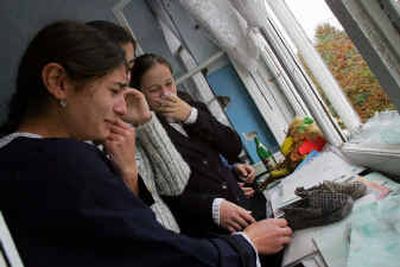Devasted Russians mark end of 40-day mourning period

BESLAN, Russia – Residents of this grief-stricken southern city on Tuesday marked the end of the 40-day mourning period for the hundreds of victims of a school massacre, lighting thin prayer candles and propping up photographs in the gymnasium at the center of the tragedy.
“My friends’ children died. My relatives’ children died. We are all dying from this,” said David Alexeyev, who was visiting from the nearby North Ossetian capital, Vladikavkaz. “Time will pass, but that won’t heal our wounds. One hundred years, 500 years – it won’t help.”
The corridors of the school rang with women’s wails and sobs while, in the surrounding streets, families set up long tables and bonfires for mourning meals. Grieving families could be identified by their men, wearing long beards that they planned to shave at the end of the 40 days.
Later, at a cemetery where many victims are buried, women in black mourning clothes threw themselves on graves and wept. Ritual offerings of bread, fruit, water and beer were placed on many of the graves. One man brought such offerings in a toy dump truck, pulling it behind him
Across Russia, priests read Masses in Orthodox churches and cathedrals, while regional politicians urged calm amid rumors that the end of the mourning period would bring a wave of revenge killings, but no violence was reported.
Some North Ossetians have vowed to seek revenge on the rival Ingush ethnic group for the deaths of the nearly 340 people – more than half of them children – in the Sept. 1-3 attack on Beslan’s School No. 1. The hostage-takers, apparently acting under the orders of Chechen warlord Shamil Basayev, included some Ingush.
“The seizure of the school in Beslan was the latest attempt to destabilize the situation in the North Caucasus,” where Chechnya is located, Ingush President Murat Zyazikov was quoted as saying by the Nezavisimaya Gazeta daily.
On Monday, he told reporters in Moscow that fears of an outbreak of fighting were overblown.
“The people of the North Caucasus have become wiser and, moreover, they are tired of war,” Zyazikov said, adding that talk of a new outbreak of war was “a provocation” that has been overplayed by media.
The Ingush, closely related to the Chechens, are predominantly Muslim. Ossetians are overwhelmingly Christian and historically have had close ties with Russians.
The Ingush and Ossetians fought a 10-day war in 1992 over rights to land as Ingush tried to return to their homes half a century after being sent into exile together with the Chechens under Soviet dictator Josef Stalin.
Thousands of Ingush live in squalid settlements and refugee camps on the border between North Ossetia and Ingushetia. Those in North Ossetia are subject to harassment, discrimination and, after Beslan, death threats. Many Ingush still claim title to land and homes now occupied by Ossetians.